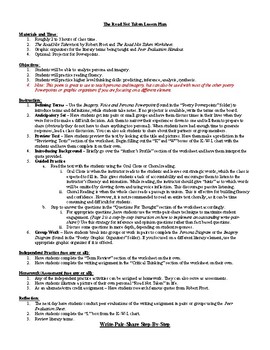

In this poem analysis lesson, students review vocabulary for the poem and read the poem. Therefore, Frost’s “The Road Not Taken” is the interpretation of the author’s vision of a youth, middle age and an older age of a person who makes decisions, stating that youth and older age are the most emotional periods while during the middle age people are the most reasonable in their choices. A part even though portrayed as physical in the poem, is more spiritual in real sense. The Road Not Taken (Yoda Voice) Just for fun, "The Road Not Taken" read like Yoda would read it. The Road Not Taken, a poem by Robert Frost is about making choices, and choices that shape our life. The hesitation comes about when the speaker reaches an intersection of roads. Chapter 1 of CBSE Class 9 English book Beehive has a poem named “The Road Not Taken”. 2017, /britishandamericanpoetry/ holds a master's degree in Latin and has taught a variety of Classical literature and language courses.

Shrestha, Roma. "The Road Not Taken by Robert Frost: Summary and Analysis." BachelorandMaster, 15 Oct. The prime theme of the poem is to choose between two paths without having any knowledge of where each road will lead. With dramatic irony, the soliloquizing speaker is permitted to characterize himself, of course unintentionally, as one who habitually wastes energy in regretting any choice made: belatedly but sadly he sighs over the attractive alternative rejected. The poem is "an indication of Frost's increasing versatility" (Thompson). The hesitation of a strong but humble man, a man who pauses before he makes a decision not because he is timid, but simply because he is accustomed to weighing and considering all his choices, even the simplest ones. It contains the element of hesitation, of indecision about what road to take. Meanwhile, we miss something good on the other path. But it is also true that whichever road we may take or decisions we make, we encounter some mishaps and meet some pleasant surprises. It is human nature to look back and blame for the minor incidents of life. Many interpretations refer to the importance of not choosing the most taken road while it is about the regret we make over the past decisions.

The poem is misinterpreted and a bit tricky. The chosen road ends up making significant change in our life and we have a curiosity of the road not taken. We are led to one direction only and we cannot come back to the same point again to make another decision. But as none can take two roads at the same time, one has to make an option and move ahead. Everyone has to face the situation of dilemma and a point where the decision becomes harder to take. And later in life we wonder how would have been our life had we taken the not chosen road. This poem is representative of the journey of life and many options that we face throughout our life where we have to make choices one over another.

The road mentioned in this poem is actual and figurative. The poem is movingly lyrical and symbolically rich and one of most cherished poem. The speaker ends on a nostalgic note, and wonders how different things would have been if he had chosen the other path. The poet says that he will go on telling this incident with a sense of sadness in the times to come. Yet he knew that one road leads mysteriously to another, and, therefore, he was not sure if he would return to travel the other road or not. The poet sadly chose the second one and kept the first one reserved for some other day. And both the roads that day looked fresh and untrodden, for the leaves of grass were standing erect. Although, keeping that thing apart, both the roads were almost identical, for both were equally trodden. Then the poet took the other road, which was equally fair and clean, and which had perhaps a better claim, since it was covered with grass and lacked foot-mark. For a long time he stood there and watched one of them, as far as he could, to the farther end where it took a curve towards the brushwood. Two roads went in two different directions in a pale forest, and the poet felt sorry that he could not take both the roads being one traveler. The speaker happens to meet a junction in the road while walking through a yellow woods.


 0 kommentar(er)
0 kommentar(er)
